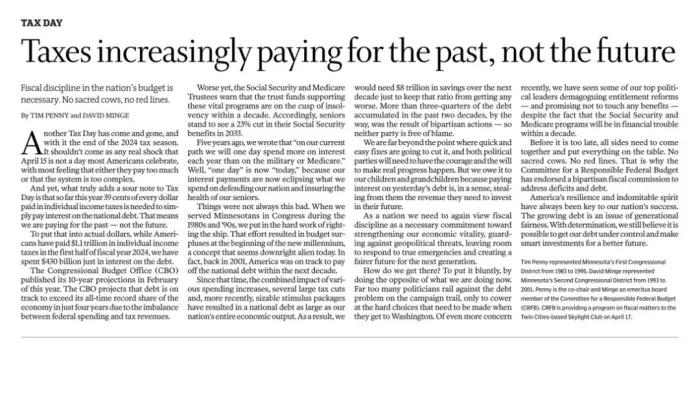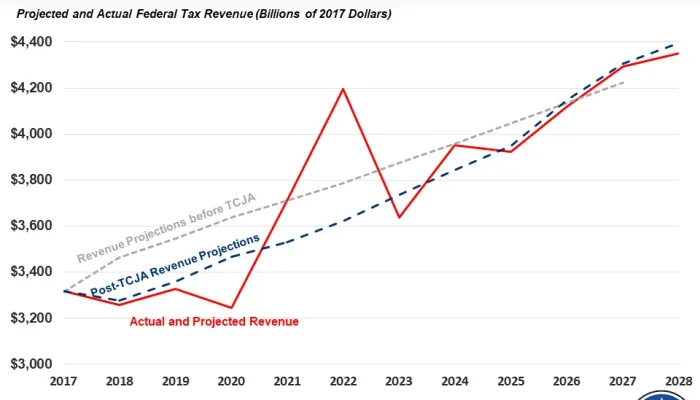Business Tax Reform Chapter Lays Out Administration's Thinking
The Council of Economic Advisers released its 2015 Economic Report of the President last week, discussing several recent economic developments and how the President's policies fit into them. One chapter of particular interest given its possibility of being on the policy agenda in this Congress is on business tax reform. The chapter discusses the problems with the current system—notably, its high marginal tax rate, relatively narrow tax base, and economically distorting incentives—and how the President's approach would help the economy, productivity, and living standards.
For background, the Administration's policy on business tax reform can be summarized between the specific policies laid out in the budget, with additional detail in its business tax framework. The budget calls for the corporate tax rate to be reduced from 35 to 28 percent and extensions/expansions of some existing tax breaks, like a permanent extension of the R&E credit and new or extended tax breaks for clean energy. The budget also contains a number of revenue-raisers that would pay for them, including a 19 percent minimum tax for income earned abroad, the elimination of tax incentives for fossil fuel producers, and the changing of inventory accounting rules.
The revenue-raisers would pay for the tax breaks but would leave only $140 billion of revenue to pay for the rate cut, only about one-fifth that is needed. However, the framework states that additional revenue could come from addressing depreciation schedules and limiting the deductibility of interest. Finally, the budget dedicates revenue to the Highway Trust Fund from a 14 percent temporary tax on earnings held abroad by U.S. companies.
| Components of President Obama's Business Tax Reform Plan | |
| Policy | Savings/Cost (-) Through 2025 |
| Reform the international tax system | $238 billion |
| Change inventory accounting rules | $84 billion |
| Eliminate fossil fuel tax preferences | $50 billion |
| Reform financial and insurance industry tax treatment | $34 billion |
| Enact other revenue raisers | $40 billion |
| Extend and expand R&E credit | -$128 billion |
| Enact/extend small business tax cuts | -$94 billion |
| Enact/extend manufacturing and clean energy incentives | -$58 billion |
| Enact infrastructure and regional growth tax cuts | -$26 billion |
| Total, Business Tax Reform Reserve | $141 billion |
| Make unspecified changes to depreciation and interest deductions | ~ $560 billion* |
| Cut corporate rate from 35% to 28% | ~ -$700 billion |
| Implement 14% transition tax on earnings held abroad | $268 billion |
| Dedicate revenue to Highway Trust Fund | -$238 billion |
Source: OMB, CBO, CRFB calculations
*Numbers represents roughly the additional revenue needed to finance the rate cut. Actual revenue may be larger since depreciation changes raise less in the long term than the short term
The chapter includes four interesting discussions of elements of business tax reform:
Letting Bonus Depreciation Remain Expired
The chapter includes a box discussing bonus depreciation, a temporary policy in effect between 2008 and 2014 that allows businesses to deduct 50 percent of the costs of certain investments immediately. Recently, the provision has been part of "tax extender" packages in recent years so there may be pressure to revive it again when the extenders are considered later this year. The report argues that bonus depreciation worked well in the context of the Great Recession and aftermath by making it easier for financially-constrained businesses to invest. It further states that small business expensing may be even more effective in that sense since small businesses are more likely to be cash-constrained. However, the conditions which made bonus depreciation attractive, the report says, have faded away and the provision would be less effective in the future. Thus, the budget does not revive the policy.
Choosing Rate Cuts over Expensing
The chapter discusses two different ways to reduce effective tax rates: either reducing statutory tax rates or allowing businesses to deduct all investments immediately, known as expensing (making bonus depreciation would move much more in the direction of expensing). The report notes that expensing would dramatically lower effective rates and be more cost-effective by only cutting tax rates on new investment rather than already-made investments. However, the report argues that statutory tax rates are more important in attracting mobile, high-return investments than depreciation and that some argue depreciation only has a modest impact on investment decisions. Further, if expensing is done without changing the deductibility of interest, it would widen the disparity between debt- and equity-financed investments. Thus, the President proposes reducing effective rates on investment by cutting rates, not by changing depreciation. Chairman Camp's Tax Reform Act from last Congress did the same, lengthening depreciation schedules to finance a rate cut.
Doing Business-Only Tax Reform
One notable aspect of the President's framework is that the Administration proposes tax reform for businesses, without applying the same base-broadening, rate-reducing framework for individuals as many other tax reform plans would do. The report states that individual reform is needed and should "do more to encourage and reward work, increase the accumulation of human capital, and ensure that economic gains are widely shared." This view is reflected in their budget proposal, which makes targeted changes to tax breaks, generally limiting them for high-income individuals and expanding them in some instances for low- and middle-earners. However, the report rejects the idea that it is necessary to lower the top individual rate (which is used by non-corporate businesses) to keep it in line with a lower corporate rate. It argues these businesses are already taxed at a lower rate than corporations, and that lowering the top tax rates is a much less targeted approach than the tax breaks the budget gives to small businesses. Congressional Republicans have generally supported doing both individual and business reform (as Camp's bill did).
Rejecting the Idea of Eliminating the Corporate Income Tax
The idea of eliminating the corporate income tax picked up some steam last year after the wave of proposed inversions last year showed some of the difficulty of maintaining the tax base. The report raises both fiscal and tax policy concerns with this approach. A straight repeal of the corporate income tax, it argues, would lose significant revenue, even greater than the amount raised by the corporate tax due to the tax sheltering opportunity the corporate sector would offer. It also rejects the idea of eliminating the tax in exchange for taxing capital gains and dividends as ordinary income, as Eric Toder and Alan Viard proposed, since it would not raise enough revenue and because a lot of corporate-level capital income flows to tax-exempt entities (resulting in no tax on that income). The report argues that in absence of sweeping changes to capital income taxation like taxing unrealized gains, eliminating the corporate income tax would not be viable. Even then, taxing gains would not raise enough revenue to replace lost corporate tax revenue.
* * *
This chapter of the Economic Report provides a lot of insight into the Administration's thinking about a number of different tax policy issues in advance of a possible deal to advance tax reform this year. In the meantime, you can try your hand at reform with our Corporate Tax Reform Calculator, which allows users to set a revenue target, pick tax cuts to eliminate, and see how low the corporate rate can go.


